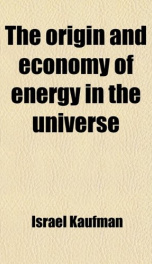the origin and economy of energy in the universe

Purchase of this book includes free trial access to www.million-books.com where you can read more than a million books for free. This is an OCR edition with typos. Excerpt from book: BOOK III. THE COMPOSITION OF FORCES THE CONSERVATION OF ENERGY BOOK III. THE COMPOSITION OF FORCES AND THE CONSERVATION OF ENERGY. Preliminary Remarks. This subject is the last, in sequence, of Part I of this work. But I ought not to conceal from my reader that what comes here last is actually first in importance, and that it is only for the sake of system and argument that I wrote five sections in advance of it. All those five sections are only an introduction to this last subject. The reader was led by me through all that labyrinth of reasoning, in order to, as far as possible, purify his mind of some of the gravest scientific notions prevailing in this department of physics today. Notions that, because sanctioned by age and because enunciated and upheld by the greatest scientific minds of the last two centuries, have taken such firm roots in the mind of every scientist, that the mere questioning of them is likely to be considered as a great scientific crimeas a wilful and unwarranted commission of sacrilege. And the daring questioner is more than likely to suffer, what will hastily be considered, a just and fully deserved punishmentinattention, and more than contempt. To dare question such primary and grand principles of science, as the law of action and reaction, the grand and sacredly held generalization of conservation of energy; to question the measure of force and the law of inertia; to attempt a refutation of potential energy; to materialize energy and call it a something, not a capacity; to dare call gravitation infinite, eternal, and one. . . . Is not such daring and such arrogance deserving ofthe severest infliction of the greatest possible punishment ? Why! these principles are the boast of science, and their achievement costs us centuries of hard ...
Info about the book
Author:
Series:
Unknown
ISBN:
3642053599
Rating:
4.5/5 (3)Your rating:
0/5
Languge:
English
Users who have this book
Users who want this book
What readers are saying
What do you think? Write your own comment on this book!
write a commentif you like the origin and economy of energy in the universe try:
Other books by this author
Do you want to exchange books? It’s EASY!
Get registered and find other users who want to give their favourite books to good hands!

